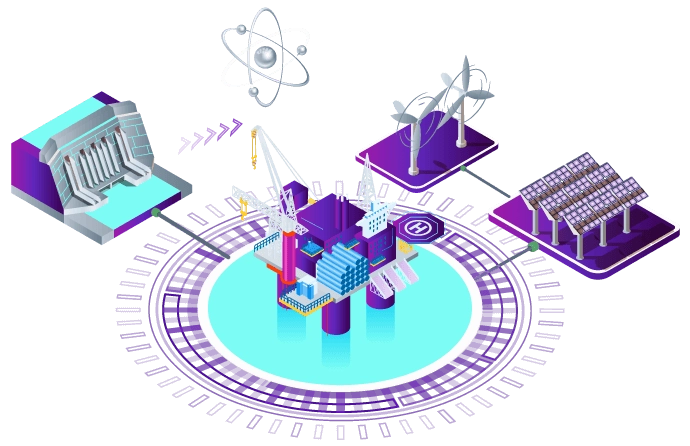Energy Sector Translation Services
To succeed in the fast-moving global energy industry, tap the expertise of Andovar’s professional translation services.
Consultation
By submitting this form, you are agreeing to Andovar's Privacy Policy.
Intro
Industry-Specialized Energy Sector Translations
Businesses that deal with oil and gas, solar power, nuclear energy, and electricity can easily affect the global economy. Even a small oil well in Texas can affect manufacturing in China if it disrupts the flow of fuel to shipping companies. For almost 20 years, Andovar has been helping energy companies face international challenges with industry-specialized translations.

Abundant and clean, solar energy comes from the conversion of the sun’s radiation into electricity through the use of photovoltaic cells. The energy can then be stored thermally or in batteries for use on a small scale in a home or in larger enterprises, such as a factory. Our specialist linguists can translate information related to all kinds of solar technologies, such as solar panels, inverters, battery packs, power meters, backup generators, and installation equipment. Your business can be involved in the manufacturing, sales, or installation of any of these components, or the management and distribution of energy. To ensure accuracy and speed while staying within your project budget, we rely on the latest translation technologies to store and reuse previously translated text while handling information exchange through the cloud.
Wherever the wind blows, such us offshore or on top of hills, the potential for generating reusable energy exists through windmills and turbines. A single installation can power one house, while a wind farm can handle the needs of entire cities. In either case, energy independence, as well as environmental sustainability, are common goals. Technologies that we cover for this industry include towers, blades, hubs, rotors, nacelles, generators, drive trains, brake assemblies, and platforms. Whether your enterprise engineers and manufactures these components, installs and services them, or dispatches the power to end-users, our translators know what your target audience needs because they are industry specialists. They efficiently convert your documents and media from your source language to that of the target audience while maintaining technical accuracy.
Hydropower, also known as hydroelectric power, harnesses moving water sources, such as rivers, streams, or waterfalls, to propel turbines that create electricity through generators. The process brings mechanical principles that have been used for at least two thousand years into the modern age. Not surprisingly, hydropower is popular in areas with heavy rainfall and plenty of water resources. This large-scale technology frequently involves dams, diversion facilities, or pumped storage. Components include turbines, blades, generators, pipelines, tanks, intake structures, powerhouses, transmission wires, and water pumps. Because hydropower often involves large-scale structures, such as reservoirs and dams, our specialist translators are not only technically savvy but aware of the environmental and political impact of this technology. We take these factors into account when delivering our localization solutions, particularly when government regulations are involved.
Nuclear power uses the energy that comes from splitting atoms to heat water so it becomes steam that turns turbines to create electricity. Unlike other alternative-energy sources, nuclear energy remains unaffected by environmental factors. Reactors continue to generate electricity at any time of day or night under any weather conditions. Only large-scale facilities can handle the demands of commercial nuclear energy, which powers cities, although smaller installations provide the motive for military vessels, such as aircraft carriers and submarines. Components for commercial reactors include steam turbines, generators, control rods, coolants, fuels, and rad water systems, and emergency core cooling systems. The complexities of this alternative-energy source demand specific advanced knowledge, which our specialist translators have because of their backgrounds in nuclear engineering. They are also sensitive to the controversies that this technology brings, especially when localizing materials, such as marketing brochures, for consumers.
Natural gas has been used for street lights since 1785, while oil, in the form of kerosene, burned lamps in 1854. These early uses lay the foundation for the current oil and gas industry that powers vehicles, heats homes, creates plastics for businesses, and produces electric power for factories. The globalization of this energy form puts most of its producers in the US, Saudi Arabia, Russia, Canada, and China, and consumers in every country. The concerns of this mature industry stretch across power generation, utilities, construction, equipment, distribution, services, and the environment. Components include drilling rigs, oil wells, wireline logging tools, storage tanks, and fuel pumps. Andovar easily handles multi-lingual conversions of this industry’s content by relying on native speakers of the target language who are also specialists in oil and gas. Our translation expertise ranges from highly technical reports for petroleum engineers to gasoline advertising for suburban car drivers.
















